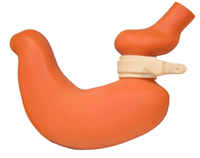 |
||||
Gastric Lap Band Surgery - A Well-Tried Weight Loss Surgery ProcedureHaving an adjustable band fitted can help you to lose a substantial amount of weight when you've tried every other way without success. But the decision to go for gastric lap band surgery shouldn't be taken lightly. As with any operation there can be pain and discomfort, as well as the risks associated with all types of surgery. That said, gastric lap banding is the least invasive kind of weight loss surgery and can be highly effective, so if you are desperate for a solution to your weight gain, it's definitely one to explore. How does gastric lap band surgery work?
Using laparoscopic techniques, the surgeon makes several small incisions in your abdomen to insert a tiny camera and perform the procedure. This method removes all the risks of open surgery, is faster and means you'll recover more quickly. A gastric lap band is a hollow ring of natural material which can remain inside your body indefinitely without any problems. The surgeon positions this ring around the top part of your stomach, creating a pouch which initially can hold approximately half a cup of food. A normal stomach has a capacity of around six cups of food. With a band in place, food enters your main stomach slowly and in a controlled way to be digested. The small stomach feels full very quickly, and tells your brain that you've eaten enough. This means that you don't get so hungry, you stay satisfied for longer, and you eat less - all of which means that over a period of time, you lose weight. Over time, you'll return to see your surgeon to have the gastric lap band adjusted. This is done by introducing a little saline solution into the band to tighten it, which restricts the flow of food between the small and main stomachs. It can take several adjustments to find the right level of restriction, so that your sense of hunger is controlled, but enough food can still be digested to meet your nutritional needs. Is gastric lap band right for you?It's no good thinking about weight loss surgery if you are up to around 4 stone overweight. Bariatric surgery is a drastic solution, and a surgeon will only consider treating you if you have 100 lb or more and have a Body Mass Index (BMI) of 40 or more, which classifies you as morbidly obese. Surgeons will sometimes treat patients with a BMI of 35 and a desired weight loss of 75lb, if they have other health risks like raised blood pressure (hypertension) or diabetes. Does obesity surgery work?Results for gastric lap band surgery can be excellent. On average, patients lose 1-2 lb a week after their operation, although the weight loss is often faster in the early weeks. Over a year, a patient can lose between 50 - 100lb in weight. To get the best results from this type of obesity surgery, you must switch to a healthier diet and follow an exercise program. Long term research is not yet available to show whether the weight can stay off permanently, but the you have a better chance of maintaining your weight loss if you stick to a better eating pattern and continue to exercise. If you're considering gastric band or gastric bypass, have an honest think beforehand about the reasons why you eat. Emotional eating, where you eat to comfort yourself or to deal with stress often underlies menopausal weight gain, and is something surgery can't cure. Getting help from a therapist could make all the difference to the success or failure of your efforts to lose weight. Complications of gastric lap bandAll types of bariatric surgery carry risks. but the following risks are specific to gastric lap band surgery:
Lap band vs gastric bypassWeigh up the pros and cons of both procedures with your surgeon, before making a decision. Gastric lap band isn't right for everyone, so take your time in deciding and make sure you discuss the procedure with health professionals fully. |
OUR FREE REPORT!
Get the Healthy Eating Habit and Lose Weight For Ever 
We hate spam and will never give away or sell your email address |
|||
|
|
||||
FEEL GOOD IN YOUR BODY!Beat-menopause-weight-gain.com does not offer medical advice. Please consult your physician before making any changes to your usual lifestyle.View our Terms of Use and Privacy Policy |
||||
|
Beat Menopause Weight Gain - Feel Good in Your Body! - All Rights Reserved - Copyright© 2008-2012
| ||||



